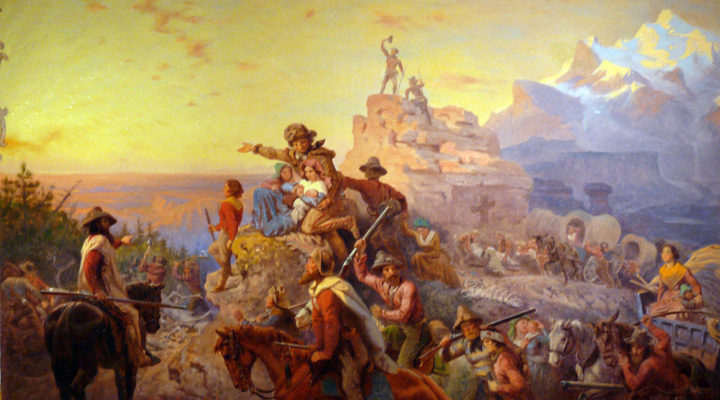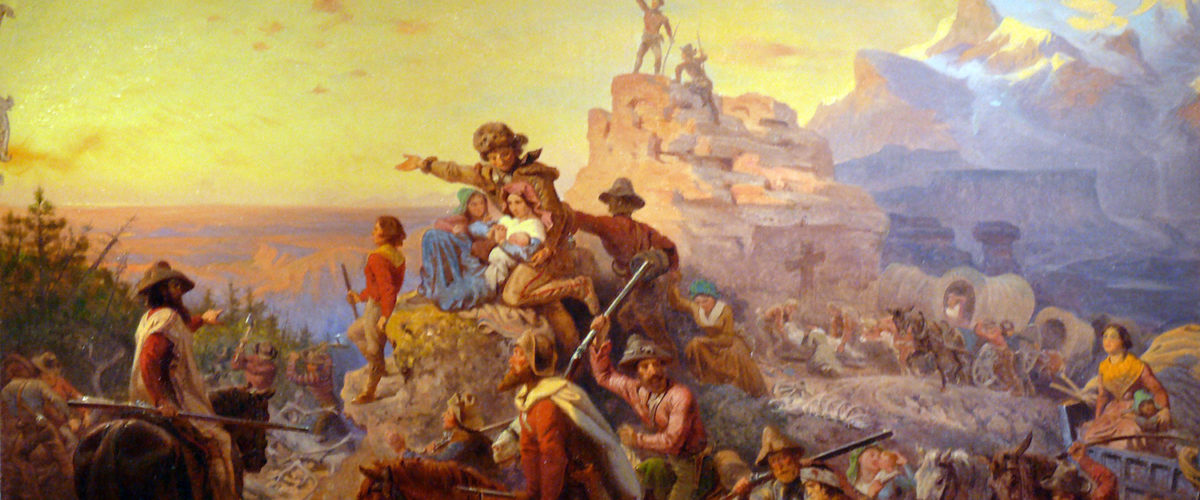 In 1630, Puritan immigrant John Winthrop wrote “A Modell of Christian Charity,” asserting:
In 1630, Puritan immigrant John Winthrop wrote “A Modell of Christian Charity,” asserting:
Wee shall finde that the God of Israel is among us, … that men shall say of succeeding plantacions: the Lord make it like that of New England: for we must Consider that wee shall be as a Citty upon a Hill, the eies of all people are upon us ….”
Phrases like Citty on a Hill, Holy Experiment and Redeemer Nation laid a foundation for American Exceptionalism, what Godfrey Hodgson calls “the idea that the United States has a destiny and a duty to expand its power and the influence of its institutions and its beliefs until they dominate the world.” Stephen Walt adds that throughout American history, some understood such exceptionalism to mean that “the United States has a divinely ordained mission to lead the rest of the world.”
Twenty-first century debates over the religious nature of the American Republic continue unabated. Is America a Christian nation? A Judeo-Christian nation? A nation grounded in Abrahamic faiths? Is American exceptionalism inherently religious or what Ian Tyrrell labels “a uniquely free nation based on democratic ideals and personal liberty?” Is its identity a Divine City on a Hill, a secular pluralism, or a materialistic Banana Republic using religion as expedient political sound and fury signifying nothing? Theories abound.
Those questions intensify right now in part because seven out of 10 Americans — across the political spectrum — say that the country is losing its sense of shared identity, a basic consensus on who we are as a people. That’s what February’s Associated Press-NORC Center for Public Affairs Research poll suggests. Yet respondents disagree on the nature of national identity. The report notes:
- “About 65 percent of Democrats said a mix of global cultures was extremely or very important to American identity, compared with 35 percent of Republicans. Twenty-nine percent of Democrats saw Christianity as that important, compared with 57 percent of Republicans.”
- “Democrats are far more likely than Republicans to say that the ability of people to come to escape violence and persecution is very important, 74 percent to 55 percent. Also, 25 percent of Democrats said the culture of the country’s early European immigrants was very important, versus 46 percent of Republicans.”
While agreeing that national identity is in trouble, we clearly disagree on what it is or might be. Nowhere is that more evident than in faith communities. The great myth-analyst Joseph Campbell wrote that “the myths by which we are living — or by which our fathers lived — can be driving us, at that very moment, diametrically apart.” These days, the Citty on a Hill has many subdivisions.
- Conservative evangelical Rod Dreher insists that orthodox Christianity is so undermined in contemporary America that Christians should consider “The Benedict Option” (the title of his new book), abandoning culture wars and creating new monastic-like environs for educating children, cultivating spirituality, and solidifying genuine faith. New York Times commentator David Brooks calls this the “purist” approach to faith and culture, those “who believe that everything in the world is part of a harmonious whole” in which “all questions point ultimately to a single answer.”
- Other conservative Christians have reentered the culture war, some seeing Donald Trump as a last ditch vehicle for restoring Christian values in the public square. Current Southern Baptist controversies surrounding ethics agency executive Russell Moore’s public critique of Trump have led many SBC churches to withhold funds from the denomination until Moore is replaced or disciplined, offering greater support to the new president, affirmed by SBC-related Christians. African-American SBC leader Dwight McKissic responds: “The outcome of this investigation will speak volumes to Black [SBC] Churches as to whether or not any church leader or entity head who publically, critically evaluate President Donald Trump will be welcome in the Southern Baptist Convention and eligible to serve in any and all levels of denominational life.” Apparently the SBC has added political inerrancy to its inerrant biblical and doctrinal non-negotiables.
- Others have joined civil rights-related protests opposing changes in voter registration laws, and budget cuts that impact aged, disabled and impoverished citizens. North Carolina NAACP leader Reverend William Barber challenges politicians who “introduced cultural memes every bit as powerful as the Confederate flag or a lynch mob’s noose. Only now, their buzzwords were “entitlements,” “big government,” and “the undeserving poor.”
- Roman Catholic bishops, among others, resist government actions regarding undocumented immigrants, and families. Bishop Joe Vasquez, chair of the Bishop’s commission on migration, writes: “We strongly disagree with the [President’s] Executive Order’s halting refugee admissions. We believe that now more than ever, welcoming newcomers and refugees is an act of love and hope.” And added: “we need to protect all our brothers and sisters of all faiths, including Muslims, who have lost family, home, and country. They are children of God and are entitled to be treated with human dignity.”
- Individuals that consider themselves “nones,” “humanists” or “secularists” question the Citty on a Hill mythology, offering alternative options for interpreting national identity. PBS commentator Krista Tippett wrote last month: “We are among the first people in human history who do not broadly inherit religious identity as a given, a matter of kin and tribe.” The “spiritual but not religious” movement, she insists, is creating a “transformation” perhaps even a new “reformation,” with “impulses” that “would make more sense to Bonhoeffer, with his intimation of “religionless Christianity,” than to [Martin] Luther.”
Whatever else Trump’s presidency means, it is a moment when nation and church must rethink identity and reclaim values, ironically returning to Harvey Cox’s Secular City words of 50 years ago: “Rather than clinging stubbornly to antiquated appellations or anxiously synthesizing new ones, perhaps … we must simply take up the work of liberating the captives, confident that we will be granted a new name by events of the future.” Amen.
Related opinion:
Related news story:


